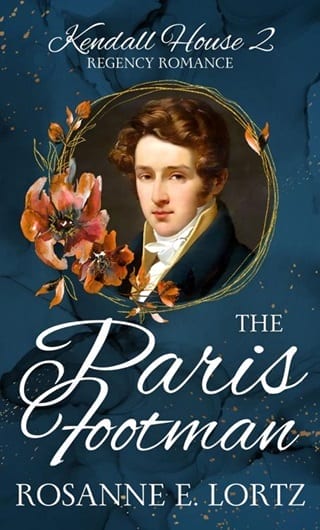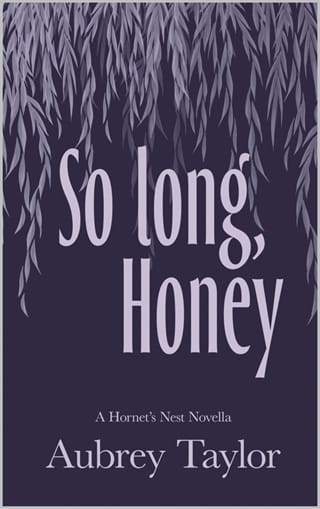2. Licence
Chapter two
Licence
M r. Smythe did not call on the house—or, at least, that was Louisa's uncle's story when she asked him a few days later. The truth of the matter, which was easily obtainable after passing a shilling to a footman, was that Mr. Smythe had called and had been sent packing while she was engaged in a painting lesson with her art tutor. Just like her other non-existent suitors, he had been summarily dismissed before she could receive word of it.
What game is Uncle Nigel playing? Does he mean to keep you on the shelf forever?
Some parents might reject their daughter's suitors because of a sentimental attachment and a wish to keep their darling daughter a little longer. But Louisa did not flatter herself that her uncle enjoyed her company. Their opinions clashed on everything, from which paper-hangings to place on the drawing room wall to which menus to order from Cook. No, if she could be got rid of, Uncle Nigel would be delirious with joy to have the townhouse to himself. So why did he persist in turning away all eligible suitors?
The matter became clear to her the following week when she overheard fat-bellied Solomon Digby scheming with her uncle in the billiards room. She had gone to the library to fetch a book—something tedious enough to lull her to sleep after a dull night at Almack's—and she overheard voices in the room next to the library. Stepping lightly in her kid slippers, Louisa approached the library door and put an ear to the cold keyhole.
"A hundred thousand pounds, you say?"
"Exactly," said her uncle with a sigh, "and I can't touch a penny of it myself. It's really most unfair. All I received from my brother was an estate encumbered with his debts. And my niece has the whole fortune from her mother sewn up in a silk purse."
Louisa knew that her father had left the Warrenton estate in disgraceful disarray, but that knowledge was not enough to make her sympathise with her uncle. He must accept the hand of cards that he had been dealt. They all must.
Odious Mr. Digby let out an oath. "Stap me, yer grace! When she comes of age, she'll be the richest gel in London."
"Yes," said her uncle meaningfully. "Or her husband will be."
Husband?
At that word, Louisa felt a thunderbolt of fury go straight to her breast. She had sharp enough wits to know which direction the conversation was tending. She pressed her ear to the door of the billiards room more tightly and heard her uncle propose to promote Digby's interest with her if the fellow would split the dowry with him .
"A pity she's my niece," said Uncle Nigel, "or I'd marry her myself and take the whole hundred thousand pounds. But as the matter stands, what do you say to half the inheritance?"
Are they really planning to carve up your mother's bequest up like a Cornish game hen?
Louisa's fingers clenched into fists. Her mother had died when Louisa was eight years old, leaving her with an inheritance of fluent French, a cache of expensive jewellery, and an account full of English banknotes. Although she had never consulted directly with a solicitor, Louisa was aware that on her twenty-first birthday, she would be wealthy indeed.
"Fifty thousand pounds and a prime filly?" said Digby, his wet lips smacking together audibly. "I'll take it. Gladly."
Louisa heard brandy being decanted and glasses clinking as they sealed their nefarious bargain. Careful not to make a sound, she backed away from the door of the billiards room. It was well she knew of her uncle's plan, for it would give her more occasion to thwart him. He would find out soon enough that the daughter of the Countess Dammartin was more than a match for the new Duke of Warrenton.
Mr. Digby became a regular dinner guest at their Mayfair home. Over the soup and souffles, Louisa attempted to ignore his crude insinuations with icy hauteur. Over the veal and venison, she tried to quell his ingratiating manner with scornful disdain. But Mr. Digby had no pride to be wounded when fifty thousand pounds were on the line. No hint enlightened him. No snub deterred him. He simply grinned a self-satisfied smile that covered both his chins and tried again to pat her hand .
Social events outside of their town house were no better. Every time Louisa turned around, the disgusting Mr. Digby was at her elbow. She was beginning to lose all pleasure in rout parties and ridottos, for as soon as she left her house she was dogged by a persistent and ponderous presence that threatened her self-possession and shattered her serenity.
The following week, her uncle was in particularly good spirits. He had bought a new curricle and a new pair of horses and seemed to be flashing about an enormous amount of cash. Louisa was no bookkeeper, but she had a good head on her shoulders. For Uncle Nigel to have a large sum on his hands was peculiar, to say the least. She knew that the Warrenton estate was all rolled up after her father had finished with it and dry as a bone after her uncle had sucked out the remaining marrow. "Where did you get the money, uncle? Gambling?"
"Of a sort," he said with a laugh. "Digby's loaned it to me, an advance on a payment I'll be making to him."
Having heard the conversation in the billiards room, Louisa was well aware what that payment would be. She decided to speak plainly with her uncle, or at least as plainly as prudence dictated. "I don't like Solomon Digby. I wish you'd stop associating with him. He's not good ton. You'd never see Viscount Landsdowne or the Earl of Kendall shaking hands with such a lout."
Uncle Nigel stiffened. "Landsdowne and Kendall received both a title and a silver spoon. They can afford to be more squeamish than I can. I'll associate with whomever I need to, Louisa, and you'll put a pretty face on matters and be polite."
"I can't be polite to a man I detest."
"Oh, I know you're a superb actress when you want to be. So, act! Act like you like him, Louisa, for I've borrowed two thousand pounds from him, and it will not go well with me if I don't repay it."
Louisa's aristocratic eyes flashed. "The more fool you, uncle."
Her uncle moved toward her menacingly. "Would you be more compliant if your amusements were taken away? No more theatre? No more Almack's? No more Vauxhall? Hmm?"
"Do what you like," said Louisa. She had turned twenty halfway through this season, and she would come of age partway through the next. She could wait out her uncle's displeasure for a year until he lost the role of guardian. Then, no matter how he complained, she could decamp from the Warrenton townhouse to her own establishment. She could find some ancient aunt or distant cousin to be her obligatory chaperone instead of Uncle Nigel. She could finally visit Paris if she pleased and see the place her mother had called home. She could set the tone of the ton and aristocratic society as she had always known she would. A year was long, but not too long when she had the rest of her life to live.
Her uncle was as good as his threat. Since Louisa refused to countenance the suitor of his choice, he gave it out that she was indisposed and cancelled all her engagements. The only caller admitted to the house was Solomon Digby. Day in and day out, Louisa never knew when she might be surprised by those heavy jowls and wide waistcoat. And no matter how much she glowered or snapped at him, she could still feel his lecherous gaze settle on her approvingly.
Mr. Digby stayed late after dinner one night, and after pretending to retire for the evening, Louisa slipped down to the billiards room keyhole once again.
"You don't seem to have captured her fancy yet," she heard her uncle remark morosely .
"What do you mean?" Mr. Digby said in surprise. "The chit's intrigued by me, I can tell. She simply likes to play games to pretend she has the upper hand."
"So…you think she'd accept you if you were to put the question to her?"
Perhaps her uncle was beginning to have his doubts about winning her over. Perhaps he was starting to wonder just how he was going to repay Solomon Digby when Louisa refused to come up to scratch.
"Who knows?" said Mr. Digby. "She might think it amusing to continue to be coy. But a special licence would salvage the situation, eh?"
"Yes, I suppose it would, but would the archbishop really ever grant such a—"
"Write me an affy-davy of her eligibility, and I'll get one," said Digby confidently. He had boasted at dinner of the mint of money he had made in trade and of the unscrupulous dealings he had used to beat out competitors. No doubt he had the money needed for a special licence and knew just which strings of influence to pull. "And I'll also find a vicar who's not too nice about matters and willing to do the ceremony out of the public eye for an extra fee."
Louisa backed away from the door with a growing sense of indignation. A special licence would mean that they could spring the marriage upon her in her own drawing room. Even if she screamed her refusal, her uncle would find some way to muzzle her and make her go through with the ceremony. Tiptoeing down the corridor, she made her way upstairs. Hopefully, it would take some time for Mr. Digby to obtain a special licence and a venal vicar, for she needed some time as well to plan a successful escape.
 Fullepub
Fullepub 



